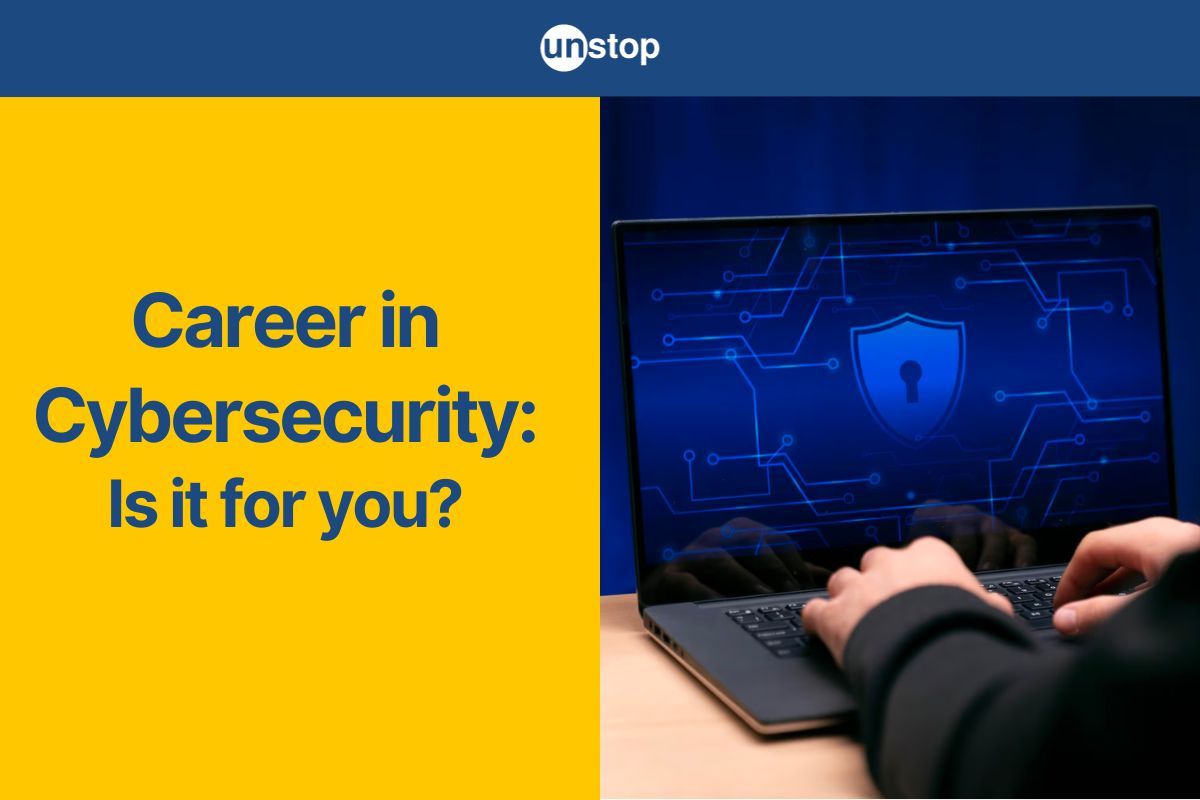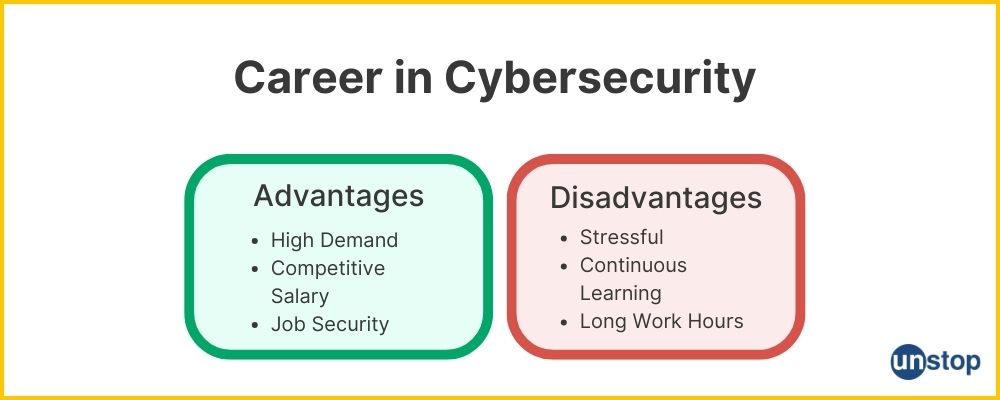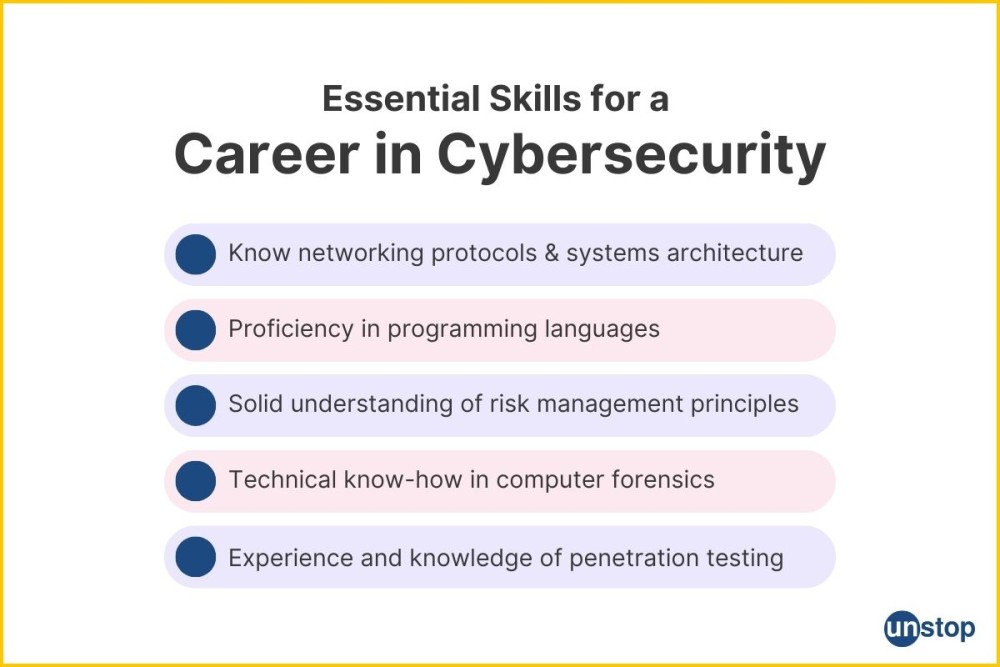- Is Cybersecurity A Good Career?: Pros & Cons
- Career Opportunities in Cybersecurity
- Average Salary & Industry Outlook
- Essential Skills for a Successful Cybersecurity Career
- Certifications and Specializations
- Future Prospects: The Growing Importance of Cybersecurity
- Self-Employment in Cybersecurity
- Frequently Asked Questions
Is Cybersecurity A Good Career Option? Let's Find Out!

If you’ve ever thought is cybersecurity a good career, then this article is for you!
The field of cybersecurity has emerged as an exciting career path, offering individuals a plethora of opportunities to make a significant impact in today's digital landscape. With the increasing number of cyber threats and attacks, the demand for skilled cybersecurity professionals is at an all-time high. This article explores the reasons why pursuing a career in cybersecurity can be a wise choice.
One of the key factors driving the demand for cybersecurity experts is the continuous growth and evolution of technology. As our reliance on digital systems increases, so does the need to protect them from malicious actors. Companies across industries are actively seeking professionals who can safeguard their sensitive data and mitigate potential risks.
Moreover, the cybersecurity field offers lucrative job prospects with competitive salaries. Organizations understand that investing in robust security measures is crucial for their survival and reputation. Hence, they are willing to compensate skilled professionals accordingly.
In conclusion, embarking on a career in cybersecurity can be highly rewarding due to its ever-growing demand, attractive salary packages, and constant evolution. By choosing this path, individuals can contribute to creating a safer digital environment while enjoying fulfilling professional growth.
Is Cybersecurity A Good Career?: Understanding Advantages & Disadvantages

| Advantages | Disadvantages |
| High Demand: There is a growing need for cybersecurity professionals, leading to numerous job opportunities. | High Stress Levels: The nature of the job can be highly stressful, as cybersecurity professionals are constantly dealing with the threat of cyber attacks and the pressure to protect sensitive information. |
| Competitive Salary: Individuals working in the field of cybersecurity often receive competitive salaries due to the high demand for their skills. | Long Hours: Cybersecurity incidents can occur at any time, so professionals in this field may be required to work long hours, including nights and weekends. |
| Job Security: With the increasing frequency and complexity of cyber threats, people employed in the cybersecurity industry enjoy job security and stability. | Continuous Learning: Cybersecurity is a rapidly evolving field, requiring professionals to constantly stay updated with the latest technologies and techniques. This can lead to a continuous learning curve and the need for ongoing professional development. |
Career Opportunities in Cybersecurity
Cybersecurity is a rapidly growing field with a wide range of career paths and opportunities. Whether you are just starting your professional journey or looking to make a career change, the cybersecurity industry offers a multitude of options for individuals interested in protecting digital assets and combating cyber threats.
One of the most appealing aspects of pursuing a cybersecurity career is the diverse range of roles available. From ethical hackers who test systems for vulnerabilities to security analysts who monitor networks for suspicious activities, there are numerous job titles to choose from. Some popular positions include:
-
Ethical Hacker: These workers use their skills to identify weaknesses in computer systems and networks, helping organizations improve their security measures.
-
Security Analyst: Responsible for monitoring and analyzing network traffic, security analysts play a crucial role in identifying potential threats and responding effectively.
-
Incident Responder: When a cyber attack occurs, incident responders step in to investigate and mitigate the damage, ensuring that systems are restored as quickly as possible.
Moreover, cybersecurity professionals have the opportunity to work across various sectors such as government agencies, financial institutions, healthcare organizations, and more. Each sector presents its own unique challenges and requirements.
In addition to diverse job roles and sectors, there are also specialized areas within cybersecurity where professionals can focus their expertise:
-
Network Security: Professionals specializing in network security focus on securing communication networks by implementing firewalls, intrusion detection systems (IDS), virtual private networks (VPNs), etc.
-
Cloud Security: With the increasing adoption of cloud computing services, experts specializing in cloud security ensure that data stored on cloud platforms remains protected from unauthorized access or breaches.
-
Digital Forensics: This specialization involves investigating cybercrimes by collecting evidence from digital devices like computers or mobile phones.
Choosing a career in cybersecurity offers a multitude of options and opportunities for growth. However, to excel in this field, gaining relevant work experience is crucial. Many employers value hands-on experience and certifications that demonstrate practical skills.
Career in Cybersecurity: Average Salary & Industry Outlook
The cybersecurity industry offers competitive salaries, with the potential for high earning potential as experience grows. Professionals in this field can expect to earn above-average salaries due to the increasing demand for their expertise.
According to recent studies, the average salary for cybersecurity professionals in India ranges from INR 5 L.P.A to INR 24 L.P.A per year.
However, it's important to note that salaries can vary depending on factors such as job role, level of experience, and geographic location within India. For instance, positions such as security analysts or penetration testers often command higher salaries compared to entry-level roles. It's crucial for individuals interested in pursuing a career in cybersecurity in India to research and consider these factors when evaluating potential salary expectations.
As professionals gain more experience and develop specialized skills within the cybersecurity field, their earning potential increases significantly. Senior-level positions like Chief Information Security Officer (CISO) or Security Architect can offer six-figure salaries or even reach into the seven-figure range.
According to a report by NASSCOM, the Indian cybersecurity market is expected to reach $35 billion by 2026, growing at a compound annual growth rate (CAGR) of 15.6%. This indicates a significant growth opportunity for individuals pursuing a career in cybersecurity in India.
The demand for cybersecurity professionals is also on the rise, with the Indian government's focus on digital transformation and increasing cyber threats. As per the report, the cybersecurity workforce in India is expected to reach 1 million skilled professionals by 2026. This highlights the positive career outlook and ample job opportunities available in the cybersecurity industry in India.
Top Countries Leading the Demand for Cybersecurity Professionals
United States
The United States is undeniably at the forefront of the cybersecurity industry, boasting a high demand for skilled professionals. This comes as no surprise considering that the country is home to numerous tech giants and government agencies that require robust cybersecurity measures. With an ever-increasing reliance on technology, both in the public and private sectors, protecting sensitive data has become paramount.
United Kingdom
The United Kingdom also stands out as a leading force in demanding cybersecurity professionals due to its growing emphasis on protecting critical infrastructure from cyber threats. As technology continues to advance rapidly across various industries, so does the need for robust security measures. The UK government recognizes this urgency and has implemented stringent regulations to ensure the protection of vital systems.
Australia
Australia has witnessed a significant surge in demand for cybersecurity professionals owing to its increased investment in cybersecurity initiatives. Recognizing the importance of safeguarding its digital landscape against cyber threats, the Australian government has allocated substantial resources towards enhancing its security capabilities.
Essential Skills for a Successful Cybersecurity Career

If you are considering a career in cybersecurity, here are some essential skills that can pave your path to success”
Strong knowledge of networking protocols and systems architecture is crucial.
To excel in the field of cybersecurity, it is essential to have a strong foundation in networking protocols and systems architecture. Understanding how computer networks operate, including TCP/IP, DNS, HTTP, and other key protocols, enables security engineers to identify vulnerabilities effectively. Having a comprehensive grasp of systems architecture allows professionals to assess potential risks and devise robust security measures accordingly.
Proficiency in programming languages enhances problem-solving abilities.
Programming skills are highly valuable in the world of cybersecurity. Proficiency in languages such as Python or C++ empowers professionals to develop effective solutions when dealing with complex security challenges. Ethical hackers often utilize their coding expertise to uncover vulnerabilities through penetration testing or application security engineering. The ability to write secure code also plays a vital role in preventing software vulnerabilities that could be exploited by malicious actors.
Solid understanding of risk management principles helps identify vulnerabilities effectively.
Risk management is an integral part of any successful cybersecurity strategy. Professionals with expertise in this area possess the ability to identify potential threats and prioritize them based on their severity. By conducting thorough risk assessments and implementing appropriate mitigation strategies, they can effectively safeguard critical information systems from potential breaches or attacks.
Technical know-how in computer forensics aids in investigating cyber incidents.
Computer forensics involves collecting and analyzing digital evidence following cyber incidents or attacks. Professionals skilled in this area play a crucial role in identifying perpetrators, understanding attack vectors, and aiding law enforcement agencies in prosecuting cybercriminals. A strong foundation in computer forensics is essential for individuals aspiring to work as digital forensic analysts or incident response specialists.
Experience and knowledge of penetration testing enhance a cybersecurity professional's skill set.
Penetration testing, also known as ethical hacking, is a practice that involves simulating real-world attacks to identify vulnerabilities in systems or networks. Professionals with experience in penetration testing possess the ability to think like hackers, enabling them to proactively identify weaknesses and recommend appropriate security measures. This skill set is highly sought after by organizations looking to strengthen their defenses against potential threats.
Certifications and Specializations for Cybersecurity Professionals
Whether you are considering a career transition or looking to enhance your qualifications, obtaining cybersecurity certifications and specializations can significantly boost your employability and expertise in this rapidly evolving field”
Validating Expertise and Enhancing Employability
Certifications like the Certified Information Systems Security Professional (CISSP) are widely recognized as the gold standard for cybersecurity professionals. Achieving this certification demonstrates your comprehensive knowledge and proficiency in various domains of information security, including risk management, cryptography, and network security. With a CISSP certification under your belt, you position yourself as a highly qualified candidate sought after by employers.
To further specialize in specific areas of cybersecurity, pursuing certifications such as the Certified Ethical Hacker (CEH) or Certified Incident Handler (GCIH) can be advantageous. These certifications provide focused skill sets that enable professionals to excel in offensive security testing or incident response roles respectively. By acquiring these specialized certifications, you demonstrate your commitment to continuous learning and mastery of niche cybersecurity disciplines.
Industry-Specific Certifications that Command Respect
In addition to generalist certifications like CISSP, industry-specific credentials hold significant value within certain sectors. For instance, CompTIA Security+ is highly regarded across industries as it covers foundational principles applicable to any organization's cybersecurity framework. This certification validates your understanding of essential concepts such as network security, access control, and cryptography.
For those interested in pursuing careers with a focus on network security infrastructure, Cisco CCNA Security is an esteemed certification that provides extensive knowledge of securing Cisco networks. This credential equips professionals with the skills necessary to design secure network architectures while mitigating potential vulnerabilities effectively.
Choosing the Right Certification
With numerous options available, selecting the most suitable path can be daunting. Consider the following factors to guide your decision:
-
Industry Relevance: Research which certifications are highly regarded within your target industry or sector. This ensures that your qualifications align with the specific needs and expectations of potential employers.
-
Career Goals: Identify your desired cybersecurity profession or specialization. Tailor your certification choices accordingly to gain the necessary expertise in that particular area.
-
Prerequisites and Experience: Some certifications may require prior experience or prerequisite certifications. Evaluate if you meet these requirements before embarking on a certification path.
-
CISO Perspective: Put yourself in the shoes of a Chief Information Security Officer (CISO) when choosing certifications. Which qualifications would they value when considering candidates for key cybersecurity roles?
Future Prospects: The Growing Importance of Cybersecurity
The growth prospects in various sectors related to cybersecurity are vast and diverse. Industries such as finance, healthcare, e-commerce, and government agencies heavily rely on secure digital infrastructures to function efficiently. Information security breaches have become a common occurrence, causing significant financial losses and reputational damage. Consequently, they seek qualified professionals capable of managing risks associated with evolving cyber threats effectively.
The advent of emerging technologies such as the Internet of Things (IoT) and Artificial Intelligence (AI) further amplifies the demand for cybersecurity professionals. As IoT devices become increasingly integrated into our daily lives – from smart homes to connected cars – the potential attack surface expands dramatically. Similarly, AI systems that power critical infrastructure or autonomous vehicles require stringent protection against malicious actors who may exploit their vulnerabilities. Cybersecurity experts play a vital role in developing secure frameworks for these technologies while mitigating risks associated with their implementation.
Self-Employment in Cybersecurity
Freelancing opportunities are abundant in the field of cybersecurity, as organizations increasingly seek external expertise for security audits and assessments. This trend has opened up a whole new avenue for professionals to embark on self-employment journeys within the cyber industry.
Independent consulting is a popular choice among cybersecurity experts due to the flexibility it offers. By working as independent consultants, individuals have the freedom to choose their projects and clients. This allows them to focus on areas that align with their interests and expertise, creating a more fulfilling career path.
Starting a cybersecurity consultancy business can be a lucrative venture for those with the right skills and experience. With businesses of all sizes becoming increasingly reliant on computer networks, software systems, and digital infrastructure, the demand for skilled cyber professionals continues to grow.
Being self-employed allows you to set your own rates based on market demand and your level of expertise. In addition to financial rewards, self-employment in cybersecurity also offers personal growth opportunities. As you take on diverse projects from different industries and organizations, you will continuously expand your knowledge base and gain invaluable experience dealing with various security challenges. This exposure not only enhances your technical skills but also strengthens your problem-solving abilities.
To thrive as a self-employed cybersecurity professional:
-
Stay updated with the latest industry trends, technologies, and best practices.
-
Network with potential clients and employers through industry events, conferences, and online platforms.
-
Continuously enhance your skills through certifications and training programs.
-
Develop a strong reputation by delivering exceptional results and maintaining client confidentiality.
We hope this helps answer the question, is cybersecurity a good career for you? Ultimately, to succeed in any field, you require hard work, continuous upskilling, and a desire to excel.
Frequently Asked Questions
1. What qualifications do I need to start a career in cybersecurity?
To start a career in cybersecurity, it is beneficial to have a bachelor's degree in computer science or a related field. However, some employers may accept candidates with relevant work experience or specialized certifications.
2. Are there specific programming languages I should learn for a career in cybersecurity?
While proficiency in programming languages like Python and C++ can be advantageous for certain roles within cybersecurity (such as penetration testing), it is not mandatory for all positions. Familiarity with scripting languages like PowerShell or Bash can also be valuable.
3. Is previous IT experience necessary before transitioning into cybersecurity?
Previous IT experience can be helpful but is not always a requirement. Cybersecurity encompasses various roles, and some entry-level positions provide on-the-job training for individuals without prior experience in the field.
4. How long does it take to obtain relevant certifications in cybersecurity?
The time required to earn certifications depends on the specific certification and your level of dedication. Some certifications can be obtained within a few months, while others may require several years of study and experience.
5. What are the main challenges faced by cybersecurity professionals?
Cybersecurity professionals face challenges such as staying updated with rapidly evolving threats, dealing with sophisticated cyber attacks, and effectively communicating security measures to non-technical stakeholders. Continuous learning and adaptability are essential in this dynamic field.
If you wish to learn about more career options, you can check these out:
I’m a reader first and a writer second, constantly diving into the world of content. If I’m not writing or reading, I like watching movies and dreaming of a life by the beach.
Login to continue reading
And access exclusive content, personalized recommendations, and career-boosting opportunities.
Subscribe
to our newsletter















Comments
Add comment